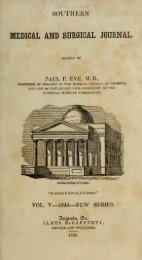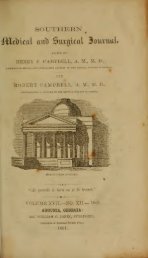:752 Lecture on Cerebral Fever. [November,in making a diagnosis, <strong>and</strong> these cases are still too frequent, thisfact, in addition to the cerebral blush upon which I have sostrongly insisted, should have a great significance. It is of importancein view of diagnosis, but it is far more so in regard toprognosis—<strong>and</strong> for this reason : the termination of cerebral feveris almost always, if not always, fatal. In the course of a longmedical career, I have never but twice seen recovery take place.Once it occurred under my own care, in the children's hospital,where w T e were able to verify the fact by an autopsy. Thereseems a contradiction between the words recovery <strong>and</strong> autopsy,which may require an explanation, <strong>and</strong> this can be easily giventhe acute disease had subsided, but was followed by a seriouschronic affection, which terminated the life of the patient fivemonths afterwards. My interne presented to the Society ofAnatomy, the brain, which had evidently been the seat of softeningfour or five months before.The other example of cure was in a child I saw in Bolougne,near Paris, in consultation with M. Blache. These two childrenare the only ones, I repeat, which I have had the good fortune tosee recover in a long practice. It shows how serious is the diseasewhich furnishes such results ; to me, its incurability seemsnearly absolute. You can comprehend, then, of how much importthe question of diagnosis must be when it is impossible toform a prognosis without it ; <strong>and</strong> here prognosis is of vital importance.We must distinguish from cerebral fever, typhoid feverwith cerebral complications, <strong>and</strong> the idiopathic convulsions ofinfancy. We cure, in fact, the greater number of young subjectsattacked with typhoid fever, even when it is of the most gravecharacter—even when accompanied by serious cerebral complications; <strong>and</strong> we cure ordinarily the convulsions of children. Butif we do not make the distinction—if we take for cerebral feverdiseases of which we have just spoken, (<strong>and</strong> typhoid fever mayeasily be confounded with it,) we shall imagine that we have curedmany cases of the disease, <strong>and</strong> be astonished at hearing practitionersof great experience avow that they have never been fortunateenough to save a single one.The third period of cerebral fever is characterized by a returnof the febrile movement. We have seen the fever of the firstperiod occurring in paroxysms of short duration, several timesrepeated in the twenty-four hours, or continued, but moderate,<strong>and</strong> with frequent remissions. In the second period of the disease,the pulse, on the contrary, was remarkably slow ; in thethird period, it becomes extremely frequent, <strong>and</strong> this frequencygoes on increasing until death terminates the case. It is atthe same time sharp, <strong>and</strong> the skin is warm, but it is singular, <strong>and</strong>the fact is of value in the diagnosis, that the thirst which generallyattends fever of every kind, does not exist in the disease
1859.] Lecture on Gerebral J' 753under consideration. While children, suffering from cerebralcomplications in typhoid lever, from scarlatina., from any otherpyrexia, or any inflammation, dem<strong>and</strong> drink eagerly, or it' unableto talk., make known, by certain pantomimic actions, the thirstwhich torments them, nothing of the kind is seen in patients attackedwith cerebral fever. There is no thirst, or. at least, noevidence of any is given. Not only do the little patients not askfor drink, but when it is offered they manifest repugnance to it.Does this repugnance arise from the difficulty of deglutitiou experiencedby them ? This may be ; but whatever the explanation,the fact is the same.Already in the second period, a symptom had made its appearncewhich, although present then, is of course much morerongly marked in the third. I allude to the state of depressioninto which the patient has fallen. Completely indifferent towhat passes around it, it observes nothing, is disturbed by nothing; everything which pleased it formerly, its toys, the amusementsof its age, are now unnoticed, <strong>and</strong> it lies in a state of completeimmobility : sometimes it responds when spoken to, butnever asks questions of its own accord ; while in everv otherdisease, it will call for its mother, its nurse, <strong>and</strong> those it is accustomedto see, manifesting in a word desires, in cerebral fever itseems to have no spontaneous ideas <strong>and</strong> no wants. In the firstperiod of the disease, we can awaken the patients by disturbingthem. They complain <strong>and</strong> cry upon being irritated; but in thethird period this is no longer the case— nothing rouses them fromtheir deep depression.Convulsions are sometimes, but rarely, observed at the commencementof the disease ; in the second or apyretic period, thereare none, properly speaking, but there is something resembling:them—something analogous to the epileptic vertigo ; the childopens its eyes quickly, <strong>and</strong> they remain singularly" motionless.This convulsive movement manifests itself more decidedlv in thethird period, <strong>and</strong> then also appear symptoms of jxiralysis, whichin some cases occur towards the end of the former stage. Thus,when our little patient opened its eyes, one of them was muchmore widely opened than the other, for the levator palpebrae beganto be sluggish ; there was also strabismus. These symptomsindicated clearly that paralysis was commencing:, <strong>and</strong> an attentiveexamination showed that it had already extended to other partsof the body. In an infant, we can establish this fact, by laying itupon its back <strong>and</strong> tickling alternately the soles of its feet : itdraws back one foot much more readily than the other: the poweror motion is impaired upon one side, sensibility is also less,<strong>and</strong> a greater stimulus is required upon this side to produce thesame effects. The parents will tell you. besides, that their childallows one arm to lay along by its body more than the other,
- Page 1 and 2: SOUTHERNMEDICAL AND SUBGICAL JOURNA
- Page 3 and 4: 1859.] Climate to the Consumptive,
- Page 5 and 6: 1859.] Climate to the Consumptive,
- Page 7 and 8: Aug.Oct.1859.] Climate to the Consu
- Page 9 and 10: 1859.] Climate to the Consumptive,
- Page 11 and 12: 1859.] Climate to the Consumptive,
- Page 13 and 14: 1S59.] Climate to tJte Consumptive,
- Page 15 and 16: 1859.] Climate to l/ie Consumptive,
- Page 17 and 18: 1859.] Climate to the Consumptive,
- Page 19 and 20: 1859.] Climate to the Consumptive,
- Page 21 and 22: 1859.] Dugas, on Fracture of Hie Sc
- Page 23 and 24: 1869.] Lecture upon Cerebral Fever.
- Page 25 and 26: • of1859.] Lecture on Cerebral Fe
- Page 27 and 28: 1859.] Lecture on Cerebral Fever. 7
- Page 29: 1859.] Lecture on Cerebral Fever. 7
- Page 33 and 34: 1859.] Lecture on Cerebral Ftthey a
- Page 35 and 36: :1859.] Attempted Abortion and Deat
- Page 37 and 38: 1859.] Attempted Abortion and Death
- Page 39 and 40: :—:1859.] Diphtheria. 761by its o
- Page 41 and 42: —:1859.] Diphtheria. 763ride of i
- Page 43 and 44: ——1859.] Diarrhoea of Infants a
- Page 45 and 46: 1859.] Action of Mercury on the Sec
- Page 47 and 48: 1859.] Defective Assimilation in In
- Page 49 and 50: —1859.] Cancerous Ulceration clos
- Page 51 and 52: —1859.] Vegetation of the Genital
- Page 53 and 54: 1859.] Gases of Suppression of the
- Page 55 and 56: 1859.] Cases of Suppression of the
- Page 57 and 58: ——;1859.] After-treatment of th
- Page 59 and 60: 1859.] Dr. 0. C. Gibbs. Summary. 78
- Page 61 and 62: 1859.] Dr. 0. C. GrBBS. Summary, 78
- Page 63 and 64: :;1859.] Secale Cornulam for t?ie E
- Page 65 and 66: 1859.] Divisions for the Cure of De
- Page 67 and 68: ;1859.] Incision in Anthrax. 789Inc
- Page 69 and 70: :;1859.] Editorial and Miscellaneou
- Page 71 and 72: ———and1859.] Miscellaneous. 7








